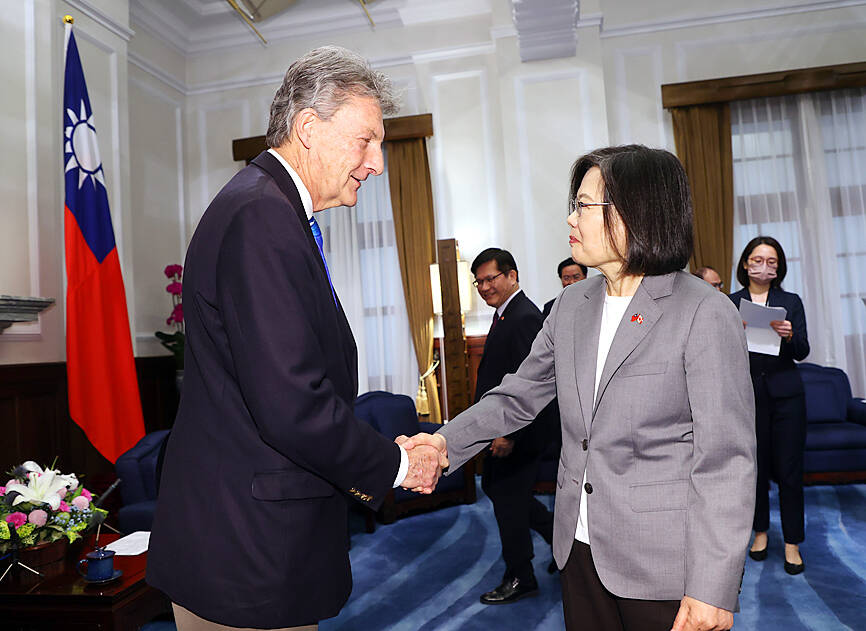“Taiwan’s issues are Canada’s issues and Canada’s issues are Taiwan’s issues,” Canadian lawmaker John McKay told President Tsai Ing-wen (蔡英文) yesterday during a meeting at the Presidential Office in Taipei.
McKay, chair of the Canadian parliament’s Committee on National Defense, said that the lawmakers in the delegation he is leading in Taiwan all hold “significant positions in their parties and committees.”
“It is a testimony to the concern that Canada has for the ongoing viability of Taiwan that we are here,” he said. “Interference and influence operations carried on by the government of China” have “heightened our awareness ... and brought us together as democratic nations facing this menace.”

Photo: CNA
The delegation’s visit, which is to conclude on Saturday, has allowed them to observe how Taiwan has strengthened its democracy and prosperity, McKay said.
The delegation has achieved this despite “the massive effort on the part of the People’s Republic of China [PRC]” to prevent its members from doing so, he said.
Lawmakers from all four of Canada’s major political parties are part of the delegation, which also includes members of the Canadian parliament’s foreign affairs, national defense and Canada-China relations committees.
The visit comes less than two weeks after the Canada-China committee, chaired by delegation member Ken Hardie, published a report titled Canada and Taiwan: A Strong Relationship in Turbulent Times.
The report, which Hardie gave a copy of to Tsai yesterday, included 18 recommendations to bolster bilateral economic, trade, cultural and diplomatic ties, while adhering to Canada’s “one China” policy.
The report said that the Canadian federal government should declare that the people of Taiwan are the sole arbiters of Taiwan’s future and call on Beijing to refrain from escalating military threats.
Meanwhile, Tsai called on the visiting lawmakers to support Taiwan’s bid to join the Comprehensive and Progressive Agreement for Trans-Pacific Partnership (CPTPP), a regional trade bloc of which Canada is a member.
“We hope that Canada will support Taiwan’s accession to the CPTPP,” Tsai said. “Taiwan has made all the necessary preparations. We meet high standard international trade rules and strive to create greater growth and prosperity together with our partners.”
McKay acknowledged Taiwan’s desire to join the CPTPP, saying: “We hope that our presence here will push toward that right direction.”
The CPTPP, which grew out of the Trans-Pacific Partnership abandoned by the US in January 2017, is one of the world’s biggest trade blocs, representing a market of 500 million people and accounting for 13.5 percent of global trade.
For a new member to join the CPTPP, all 11 signatories — Australia, Brunei, Canada, Chile, Japan, Malaysia, Mexico, New Zealand, Peru, Singapore and Vietnam — must approve the application.
Taiwan applied on Sept. 22, 2021, less than one week after China submitted its own application.

‘TAIWAN-FRIENDLY’: The last time the Web site fact sheet removed the lines on the US not supporting Taiwanese independence was during the Biden administration in 2022 The US Department of State has removed a statement on its Web site that it does not support Taiwanese independence, among changes that the Taiwanese government praised yesterday as supporting Taiwan. The Taiwan-US relations fact sheet, produced by the department’s Bureau of East Asian and Pacific Affairs, previously stated that the US opposes “any unilateral changes to the status quo from either side; we do not support Taiwan independence; and we expect cross-strait differences to be resolved by peaceful means.” In the updated version published on Thursday, the line stating that the US does not support Taiwanese independence had been removed. The updated

‘CORRECT IDENTIFICATION’: Beginning in May, Taiwanese married to Japanese can register their home country as Taiwan in their spouse’s family record, ‘Nikkei Asia’ said The government yesterday thanked Japan for revising rules that would allow Taiwanese nationals married to Japanese citizens to list their home country as “Taiwan” in the official family record database. At present, Taiwanese have to select “China.” Minister of Foreign Affairs Lin Chia-lung (林佳龍) said the new rule, set to be implemented in May, would now “correctly” identify Taiwanese in Japan and help protect their rights, the Ministry of Foreign Affairs said in a statement. The statement was released after Nikkei Asia reported the new policy earlier yesterday. The name and nationality of a non-Japanese person marrying a Japanese national is added to the

AT RISK: The council reiterated that people should seriously consider the necessity of visiting China, after Beijing passed 22 guidelines to punish ‘die-hard’ separatists The Mainland Affairs Council (MAC) has since Jan. 1 last year received 65 petitions regarding Taiwanese who were interrogated or detained in China, MAC Minister Chiu Chui-cheng (邱垂正) said yesterday. Fifty-two either went missing or had their personal freedoms restricted, with some put in criminal detention, while 13 were interrogated and temporarily detained, he said in a radio interview. On June 21 last year, China announced 22 guidelines to punish “die-hard Taiwanese independence separatists,” allowing Chinese courts to try people in absentia. The guidelines are uncivilized and inhumane, allowing Beijing to seize assets and issue the death penalty, with no regard for potential

‘UNITED FRONT’ FRONTS: Barring contact with Huaqiao and Jinan universities is needed to stop China targeting Taiwanese students, the education minister said Taiwan has blacklisted two Chinese universities from conducting academic exchange programs in the nation after reports that the institutes are arms of Beijing’s United Front Work Department, Minister of Education Cheng Ying-yao (鄭英耀) said in an exclusive interview with the Chinese-language Liberty Times (the Taipei Times’ sister paper) published yesterday. China’s Huaqiao University in Xiamen and Quanzhou, as well as Jinan University in Guangzhou, which have 600 and 1,500 Taiwanese on their rolls respectively, are under direct control of the Chinese government’s political warfare branch, Cheng said, citing reports by national security officials. A comprehensive ban on Taiwanese institutions collaborating or